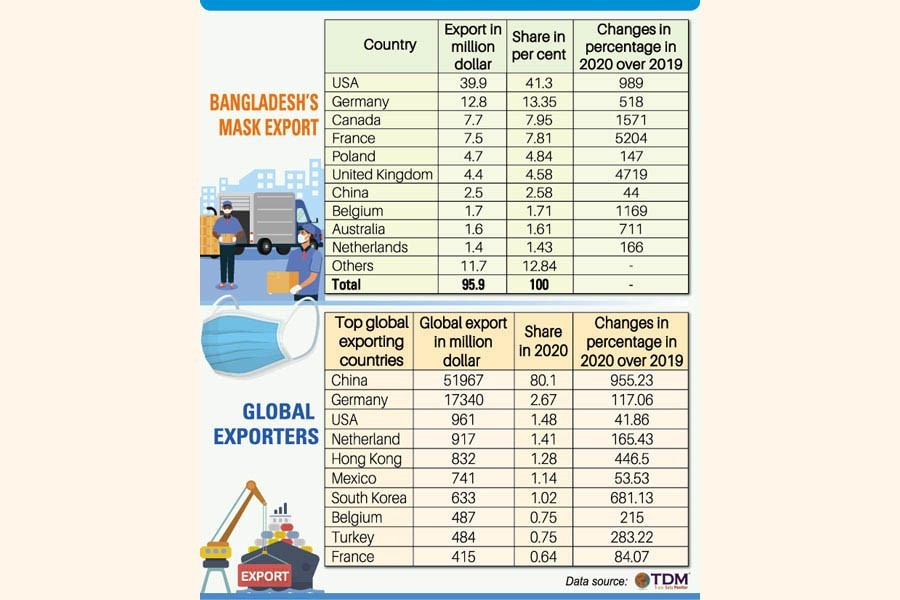Bangladesh exports face masks worth about $100m since coronavirus outbreak

Published :
Updated :

Exports of face masks from Bangladesh increased in the first eleven months of 2020 during the prolonged pandemic, contributing to the diversification of the country's export basket.
The country exported US$95.9 million worth of masks during the period between January and November last year, according to the Trade Data Monitor (TDM), the world's top source of trade statistics.
During that period, the global market for masks was worth $65 billion and China was the global market leader for the product, grabbing more than 80 per cent of the world market.
Bangladesh mostly exported surgical and KN95 masks worth nearly $40 million to the USA market during the January-November period. The exports to the US accounted for over 41 per cent of the total shipment while Germany became the second biggest importing country of the Bangladeshi product, according to the TDM.
Canada imported Bangladeshi masks worth $7.7 million during the 11-month period, making the North American country the third biggest importing country of the Bangladeshi product.
However, the TDM could not provide any data about the quantity of masks exported by Bangladesh, as some countries import the masks by piece count while some others by kilogram. The USA imports it by piece count while Canada by kilogram.
The other importing countries of the product from Bangladesh are France, Poland and the United Kingdom.
According to the TDM, China also imported masks from Bangladesh, mostly through joint venture efforts. China may have imported partially-manufactured masks from Bangladesh and later exported them by adding more values.
Don Brasher, the CEO of Geneva-based TDM, told the FE through a digital platform recently: "Bangladesh's textile sector has been incredibly resilient in helping meet the world's need for masks, gowns and other essentials to fight the Covid-19 pandemic."
This has diversified the country's export basket amid the pandemic, he added.
The garment sector of the country, the world's second largest exporter, was hit hard particularly during the lockdown in April and May last year.
But export orders of such products not only helped diversify the export basket but also helped increase its overall shipments during the ongoing pandemic, the TDM chief said.
Smart Group, a local mask exporting company, said Bangladesh has a long tradition for manufacturing different types of clothing.
"Although this is medical product but it has a link with the clothing manufacturing sector," said Mostafizur Rahman, Chairman at Smart Group.
Bangladesh had also exported many PPE gowns and other Covid-related clothing in 2020, he added.
Mr Rahman also said the third wave of Covid-19 might help boost the exports of the same and other related products. The Group produces surgical and KN95 masks for both local and export markets.
Local medical device manufacturing company--JMI--has also made similar products for export.
Bangladesh is heavily dependent on clothing exports. The garment factories here employ more than 4.0 million people and generate around 85 per cent of its export receipts.
In 1980, Bangladesh denationalised hundreds of textile manufacturing units, set up export processing zones and invited foreign investors and advisers, especially from the USA.
The result was a flurry of contracts with designers and retailers in the USA and Europe, making "Made in Bangladesh" a common tag on clothes around the world.
Bangladesh's accession to the World Trade Organization in 1995 solidified its place as a key player in global trade.
In 2019, Bangladesh exported $34.7 billion worth of textiles, second in the world only to China with $138 billion, according to the TDM data.
Vietnam was third with $31.4 billion while Germany was fourth with around $23.9 billion.
jasimharoon@yahoo.com


 For all latest news, follow The Financial Express Google News channel.
For all latest news, follow The Financial Express Google News channel.